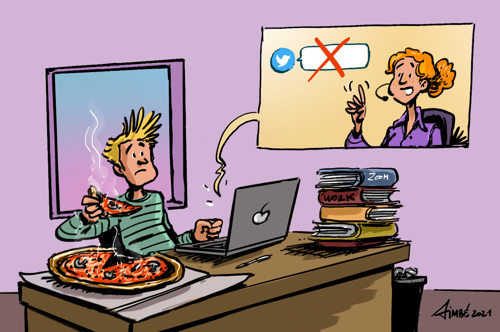- Employment Law
- Social Media post , employee , employer , right of privacy , freedom of speech , termination for a substantial reason
Can an employer take action if one of his employees posts a message on a social media channel that is harmful to him or his company?
Recently, social media have become a handy and powerful tool "we all like". Its use in the professional context is also unimaginable.
Many companies even welcome and encourage the use of social media by their employees to promote their company's activities, products and services.
Many employees have a personal profile on social media where they can profile themselves as an employee of a certain company or not.
While the employer can, to a certain extent, control the use of social media by his employees that is directly related to the company, the question and the answer become more sensitive when this happens outside the professional context.
The question arises as to whether an employer can take action when an employee uses social media to express negative views about the company and its products and services or to post a statement that fundamentally contradicts the philosophy and activities of the employer. It is not excluded that such "social media post" has a negative impact on the company.
For example: Peter works for a pharmaceutical company that has just launched a new medicinal product on the market. He explicitly expresses his dissatisfaction about this, not only verbally to his colleagues and friends, but also on a public Facebook page that clearly shows that he is an employee of that pharmaceutical company. A regular customer of the company, who has just ordered a large stock of that product, becomes aware of this and asks the pharmaceutical company for an explanation. Peter is subsequently called to account by his employer. His statements on Facebook could have far-reaching consequences.
The employer will undoubtedly not "like" this, but can he actually do anything against it?

1. What are the employee's rights in this regard?
There is no specific legislation regulating on the use of social media in the workplace and beyond.
But employees can invoke their right to privacy and freedom of speech.
The employer must therefore ensure that he can reconcile his authority with this through the various existing legal instruments made available to him (ECHR, CLA no. 81, GDPR, etc.).
After all, there is a chance that a "social media post" containing a remark about the employee's company, its product or service becomes publicly accessible and available to all other internet users (e.g. remarks made on public pages on Facebook, LinkedIn, Instagram, etc.), despite a privacy-protected profile of the employee.
But what are the limits of the employee's right to privacy and freedom of speech?
2. Right on privacy is not an absolute right
Employees should be aware that statements or behaviour on social media, blogs, forums and other websites based on 'user generated content' may also be visible to other internet users, including the employer and his customers, suppliers and other partners.
In this sense, the right to privacy is not an absolute right.
The European Court of Human Rights has already confirmed on several occasions that the right to privacy can be compromised to the extent that an individual's private life is brought into contact with public life.
The right to privacy must therefore be framed within the reasonable privacy expectations of the employee. The question must be asked whether, in the given circumstances, the employee could reasonably expect an intrusion into his private life. The more publicity the employee gives to his statements on the internet and social media, the more he can expect others to take note and the less he will be able to invoke the right to his private life.
With social media posts, it goes without saying that his employer can also find or consult this information, with the result that it is no longer so obvious that the employee can invoke his privacy right against his employer.
It is therefore extremely important to be aware of this...
3. What about the freedom of speech?
Freedom of speech is not absolute as well.
In general, it is accepted that criticism, for example of an employer, should be possible as long as it is not done in an insulting or defamatory way or if the employee does not make it public so that no damage can be done to the employer or its reputation.
Criticism by the employee of the employer or of its policies, products and services on the part of social media that is accessible to the public may lead to termination for a substantial reason (cf. the example of Peter). This has been accepted and confirmed by the labour courts on several occasions.
Within the framework of the law on employment contracts, the employee and the employer must respect each other (translated in the principle of good faith) and the employee has a duty of loyalty towards his employer.
It follows that the employee must refrain from actions that could be harmful or disloyal to the employer and his company, including negative statements on social media.
Thus, the employer, while respecting the fundamental rights of the employee, may rely on the mechanisms provided by the Employment Contracts Law and other legal instruments (Collective Bargaining Agreement No. 81), in order to adjust and even sanction the employee's behaviour on social media.
4. Conclusion
An employment relationship has an important impact on fundamental rights such as privacy and freedom of speech of the employee as the employer exercises authority within this relationship.
From what we have seen above, the right to privacy and freedom of speech is not absolute and employees must take this into account in their expectations on the protection of these rights.
It is therefore extremely important, as an employer, to make clear agreements on this by implementing a reasonable social media policy. This can be ensured by introducing a balanced social media policy.
Would you like to know what the best approach is for your company? We will be happy to help you with the further development of a social media policy. Feel free to contact us at info@seeds.law.



